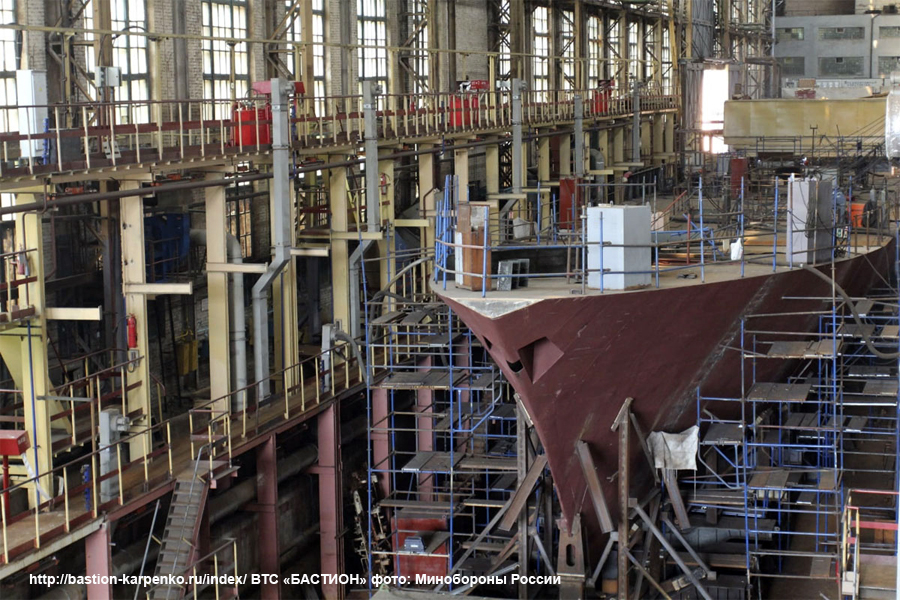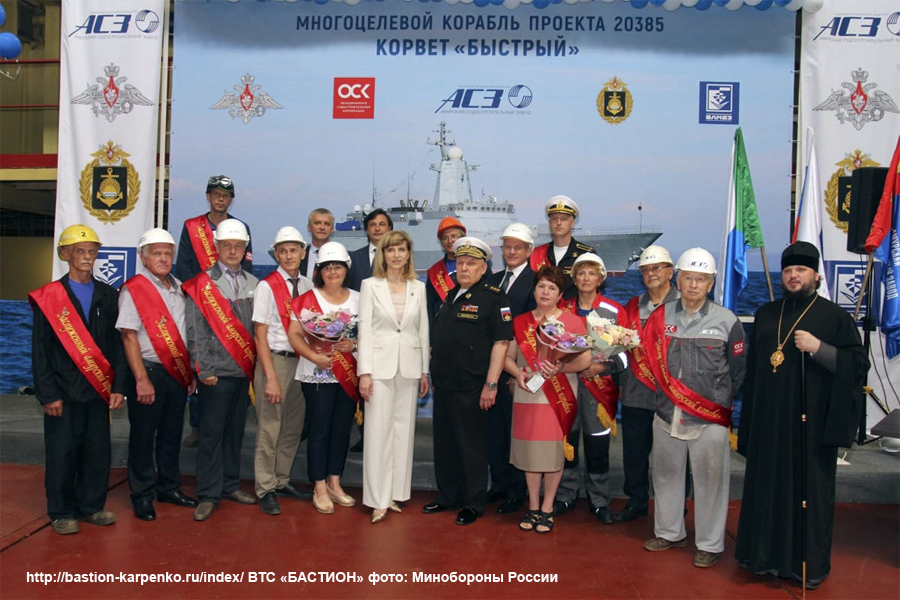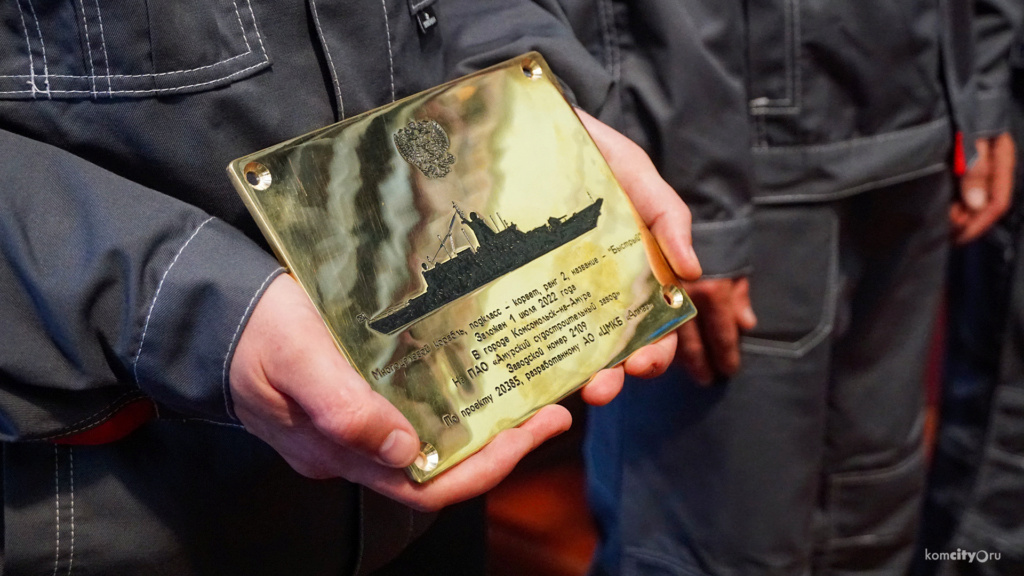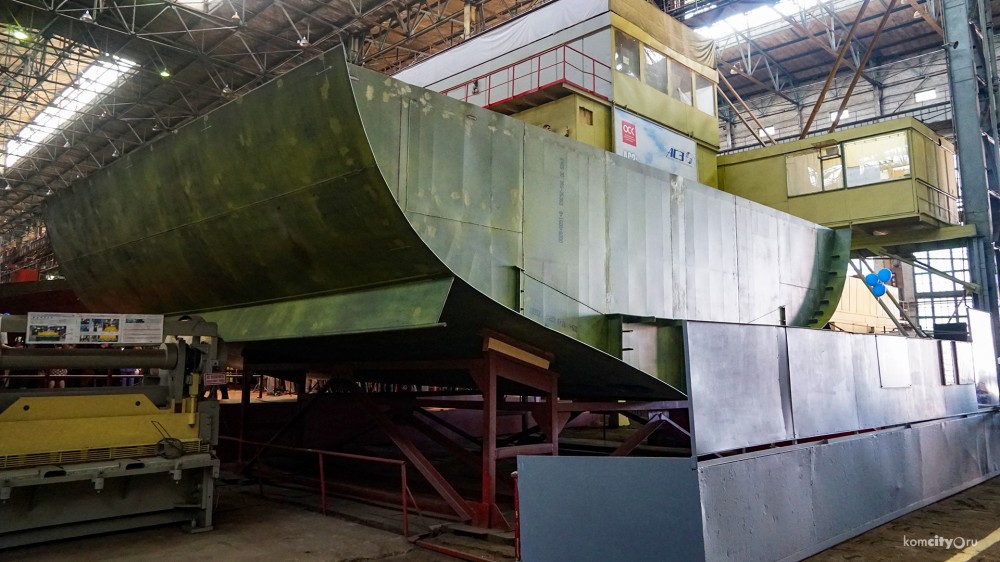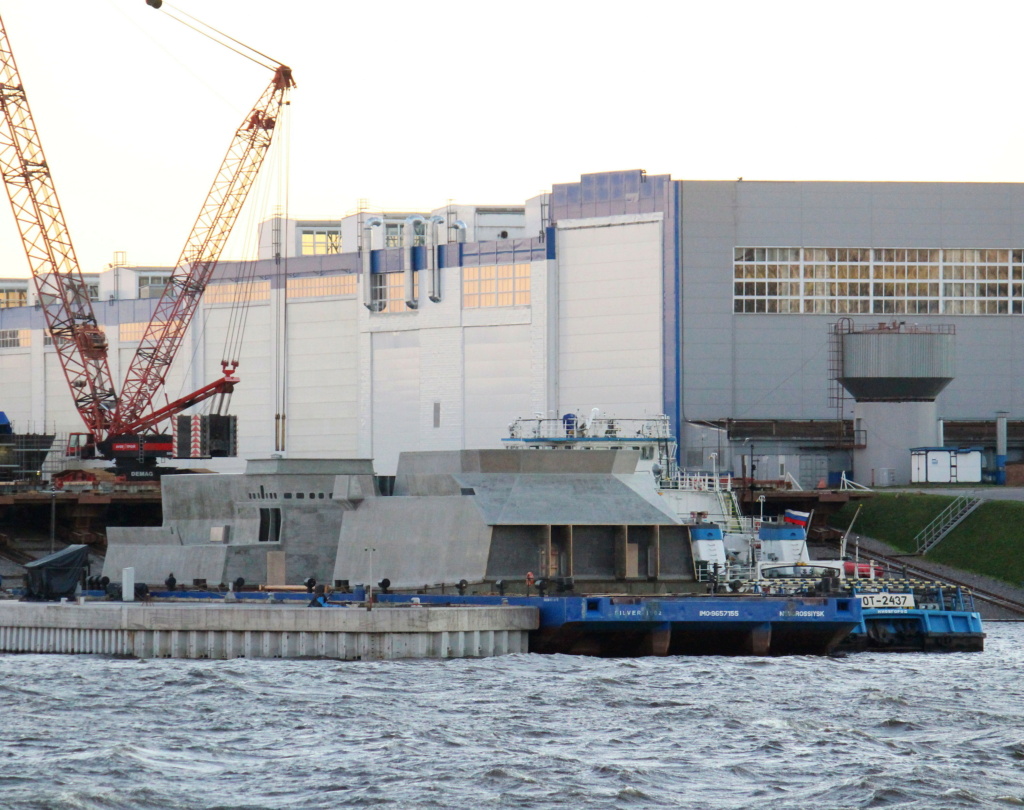Project 20380(5): Steregushchy Corvette #2

Podlodka77- Posts : 2589
Points : 2591
Join date : 2022-01-06
Location : Z
George1, LMFS, Hole and Krepost like this post

Podlodka77- Posts : 2589
Points : 2591
Join date : 2022-01-06
Location : Z
GarryB, George1, Big_Gazza, Hole and Belisarius like this post

Podlodka77- Posts : 2589
Points : 2591
Join date : 2022-01-06
Location : Z
medo, George1, Hole and Granger like this post

Krepost- Posts : 786
Points : 788
Join date : 2021-12-08
GarryB, George1 and Big_Gazza like this post

George1- Posts : 18520
Points : 19025
Join date : 2011-12-22
Location : Greece
A project 20385 Razumny corvette was laid down at the Amur Shipyard
On Russia Day, June 12, 2022, at JSC Amur Shipbuilding Plant (NPP, part of JSC United Shipbuilding Corporation - USC) in Komsomolsk-on-Amur, the ceremony of laying the Razumny corvette for the Russian Navy (serial number 2108) took place project 20385. The bookmark was dedicated to the 90th anniversary of the city of Komsomolsk-on-Amur. This is the second project 20385 corvette being built at this enterprise.
Recall that on December 15, 2020, the Amur Shipyard signed a contract with the Russian Ministry of Defense for the construction of six corvettes for the Pacific Fleet - two project 20380 and four project 20385, which should be put into operation from 2024 to 2028. Corvettes of project 20380 received serial numbers 2105 and 2106, and corvettes of project 20385 received serial numbers from 2107 to 2110.
On August 23, 2021, the laying ceremony for the Russian Navy of the first two corvettes for the Russian Navy under this contract - Grozny (serial number 2105) of the project 20380 and "Rampant"(serial number 2107) of project 20385, which became, respectively, the fifth project 20380 corvette and the first project 20385 corvette built at this enterprise. On September 29, 2021, the laying of the second Bravy corvette under this contract (serial number 2106) of project 20380, which will be the sixth and last corvette of project 20380 built in the Far East, took place at NEA.
To date, ASZ has carried out, under previous contracts, the construction of four project 20380 corvettes for the Pacific Fleet. The designer of all corvettes of the 20380 and 20385 families is Almaz Central Design Bureau JSC .
The Razumny corvette (serial number 2108), now laid down at NEA, has become the fourth overall project 20385 ship in the series. the construction of corvettes for the Russian Navy was supposed to be carried out according to the revised project 20385. The state contract for the construction of the first two corvettes of project 20385 was issued by the Russian Ministry of Defense to the Northern Shipyard on March 27, 2006, both ships were intended for the Pacific Fleet. The lead ship of project 20385 "Thundering" (serial number 1005) was laid down at Severnaya Shipyard on February 1, 2012, launched from the boathouse of the enterprise on June 16, 2017, launched on June 30, 2017, began factory sea trials on April 21, 2019 and was commissioned by the Russian Navy only on December 29, 2020 with enrollment in the Pacific Fleet. On November 30, 2021, the Thundering corvette arrived in Vladivostok.
The second project 20385 Provorny corvette ( serial number 1006) was laid down at Severnaya Shipyard on July 25, 2013. In September 2019, its technical launch was carried out, but then the ship's hull was again raised to the slipway. On December 17-18, 2021, a fire broke out on the Provorny corvette under construction at Severnaya Shipyard , which almost completely destroyed the ship's superstructure, as a result of which the readiness of the corvette has now been pushed back to about 2026.
Under an additional contract concluded with the Ministry of Defense in 2011, it was planned to build eight more project 20385 corvettes at Severnaya Verf by 2020, however, the widespread use of imported components on this project, including German MTU main diesel engines that fell under sanctions restrictions after 2014, led to the fact that the series of project 20385 at Severnaya Verf was limited to only two ships laid down under the 2006 contract.
The construction of both laid corvettes at the Severnaya Shipyard of project 20385 was greatly delayed due to the non-delivery of MTU main diesel engines for them. On January 30, 2015, the Russian Ministry of Defense entered into an additional agreement with Severnaya Verf for the completion of both project 20385 corvettes with Russian-made diesel engines - 1DDA-12000 diesel units manufactured by Kolomensky Zavod JSC, installed on project 20380 corvettes. Each corvette received two diesel units, one unit 1DDA-12000 includes two main marine engines 16D49 with a capacity of 6000 hp. production of the Kolomna plant and reverse gear RRD 12000, produced by Zvezda JSC.
Since further construction of the project 20385 series was discontinued, as a result, the Russian Navy returned to the construction of project 20380 corvettes according to the once again revised project, with the installation of a new Zaslon multifunctional radar complex with the placement of fixed antennas in a tower-like superstructure, similar to project 20385 corvettes As a
result, however, it was decided to simultaneously resume the construction of a series of project 20385 corvettes, but with Russian-made engines, as a result of which, in December 2020, the above contract was signed with NEA for the construction of four project 20385 corvettes . Now the main difference between project 20385 from 20380 is the equipment of project 20385 atthe 3S14 (UKSK) universal shipborne firing system, which allows the use of missiles of the Caliber family, including anti-submarine series 91R of the Otvet complex . As can be judged, it is precisely in view of the presence of an anti-submarine missile system that all project 20385 corvettes (two buildings of the Northern Shipyard and four ordered NEAs) are apparently supposed to be concentrated in the 114th brigade of ships for protecting the water area of the Kamchatka flotilla of diverse forces of the Pacific Fleet, the main task of which is ensuring the deployment of strategic nuclear submarine missile cruisers based in Kamchatka (Vilyuchinsk).
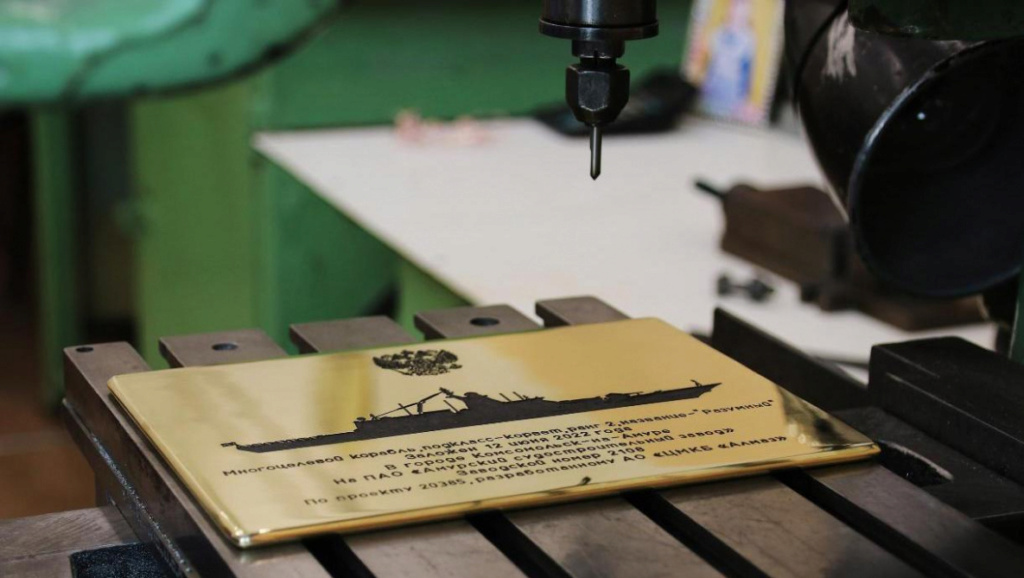
https://bmpd.livejournal.com/4539148.html
Big_Gazza, zardof, 4channer, LMFS, Hole and Arkanghelsk like this post

Krepost- Posts : 786
Points : 788
Join date : 2021-12-08
The name will be BYSTRY
So far, this class at the AMUR shipyard:
3 project 20380 Built and in service: SOVERSHENNY, GROMKY and ALDAR LONGNAME
1 project 20380 in sea trials: REZKY
2 project 20380 in construction: GROZNY and BRAVY
2 project 20385 in construction: BUYNY and RAZUMNY
1 project 20385 to be laid down: BYSTRY
GarryB, George1, Big_Gazza, zardof, owais.usmani and gc3762 like this post

Krepost- Posts : 786
Points : 788
Join date : 2021-12-08
Commander of the Pacific Fleet Adm. AVAKYANTS was present at the ceremony.
He also inspected the construction of the pr.22800 (KARAKURT), pr. 20380 (STEREGUSHY) and pr. 20385 (GREMYASHY) warships.
There will be an INTERFAX press release and hopefully some videos.
GarryB, zardof, LMFS, Hole, gc3762, Broski and Arkanghelsk like this post

GarryB- Posts : 40541
Points : 41041
Join date : 2010-03-30
Location : New Zealand
I realise a lot of members probably just wish they would lay down dozens of each type and just start making them, but we have seen some supply chain problems in international markets for all sorts of things, but also tweaks on what weapons and sensors and systems are deployed on their ships which will lead to changes for new ships being laid down, and of course propulsion systems etc etc all need to be coordinated so the required parts are ready when they are needed.
It is a very complex task that needs to be carefully managed... they will be learning valuable things from this conflict.
I remember in 1983 photos of Soviet ships started sprouting MG mounts on the flying decks of their ships with HMG mounts mostly using 12.7mm HMGs, showing they had watched the effect of Argentine pilots attacking British ships and that even rifle calibre machine gun fire with tracer ammo could put off a pilot on an attack run and the more rounds you put up towards the incoming aircraft the more likely the bomb would fall short and miss the target.
The lethality was not great but then with HMGs the lethality would certainly improve, but importantly this was not instead of existing air defence systems and equipment... this was in addition to the other systems.
Such weapons could also be used against enemy small boats approaching the ship or even shooting floating mines in the water...
Would be interesting if the remote weapons mounts being developed for light vehicles that use rifle calibre machine guns or HMGs or grenade launchers might be adapted for navy use in such roles too.

ALAMO- Posts : 7499
Points : 7589
Join date : 2014-11-25
GarryB wrote:This is good news.
I realise a lot of members probably just wish they would lay down dozens of each type and just start making them,
Fanboys, schoolkids, and armchair strategists are nothing new, no need to hype on that
There is always one question to be asked.
Considering that they would have built at 10x the numbers, and put the whole fleet on new vessels in 5 years ... what then?
What should the thousands of skilled workers, a huge chain of suppliers, and giant yards built for the purpose do ?
Just close and go fishing, right?
And in 20 years, when a new line of ships would have been started on the monitors ... who would build them, while they are all gone fishing?
GarryB, Hole and Arkanghelsk like this post

Hole- Posts : 11121
Points : 11099
Join date : 2018-03-24
Age : 48
Location : Scholzistan
GarryB and ALAMO like this post

Hole- Posts : 11121
Points : 11099
Join date : 2018-03-24
Age : 48
Location : Scholzistan
LMFS and Arkanghelsk like this post

George1- Posts : 18520
Points : 19025
Join date : 2011-12-22
Location : Greece
LMFS, Hole and Arkanghelsk like this post

Krepost- Posts : 786
Points : 788
Join date : 2021-12-08
George1 and Hole like this post

caveat emptor- Posts : 2024
Points : 2026
Join date : 2022-02-02
Location : Murrica
https://arsenal-otechestva.ru/article/1609-blizhnyaya-morskaya-zona-i-yadernoe-sderzhivanie
Near sea zone and nuclear deterrence
Alexander Timokhin
From mid-June to early July 2022, two warships of the near sea zone were laid down in Russia - corvettes of projects 20385 "Reasonable" and "Fast". The ships are to be handed over to the fleet in 2027 and 2028, respectively. Both of them are capable of carrying cruise missiles of the Caliber family of various types.
After bringing the Russian strategic nuclear forces (SNF) into line with the offensive arms reduction treaties with the United States, the share of strategic nuclear warheads deployed on submarine-launched ballistic missiles (SLBMs) is more than 40% of the total. Their carriers in the Navy are strategic missile submarines (SSBNs), which are the basis of the naval nuclear deterrence forces (NSNF), the naval component of the nuclear "triad".
Why are SSBNs needed?
The point is in the functions that submarines perform as part of the nuclear triad. Unlike aviation and ground-based strategic missile forces, the role of submarines in strategic nuclear forces is to ensure the inevitability of a retaliatory strike. They must hit the enemy, even if he performs the first strike on Russian territory, destroying most of the missile forces. Tracking Russian SSBNs in order to destroy them if necessary has become a long-standing practice of the US and British navies.
In order to guarantee the enemy's nuclear deterrence and deliver a nuclear retaliatory strike at the right time, the Navy has designated protected combat areas - limited water areas within which heterogeneous groupings of the Navy's anti-submarine forces can protect SSBNs from a superior underwater enemy, ensure their combat stability and enable them to complete their combat mission. in any circumstances.
Potential adversaries, mainly the United States and partly Great Britain (hypothetically Japan may be on this list), will obviously try to keep their multi-purpose submarines on the deployment routes of domestic strategic missile carriers in order to be able to destroy them with a surprise attack. Enemy boats can be located near Russian bases, in narrow spaces through which the submarine must pass, or wait in advance in the area where the Russian missile carrier will have to be on combat service.
Anti-submarine forces, including surface ships, are primarily needed to combat foreign submarines that threaten the deployment of SSBNs.
A significant part of the anti-submarine defense tasks in the past was solved by multi-purpose and anti-submarine ships. The most massive, performing most of the anti-submarine tasks, were small anti-submarine ships, which formed the basis of the forces of the Protection of the Water Region (OVR). Today, they urgently need a replacement - the ships are extremely worn out technically and morally obsolete to the point of complete loss of combat effectiveness. Project 20380 and 20385 corvettes were to become such a replacement, more effective in anti-submarine terms and therefore small in number, from the 2000s. Currently, 7 project 20380 corvettes (of all modifications) are in service and two are being tested. Two more are under construction. Also, one project 20385 corvette is in service, three are under construction, and another unit, Agile, needs to be restored after a fire.
In terms of anti-submarine capabilities, these ships are significantly superior to the old MPKs. They carry a towed sonar station (GAS), which makes it possible to create a significant zone of illumination of the underwater space, a helicopter capable of searching for and attacking a submarine, modern torpedoes and anti-torpedoes. Project 20385 is equipped with anti-submarine missiles that allow you to attack a detected enemy submarine at a long distance and destroy it.
Theoretically, if the fleets were saturated with a sufficient number of such corvettes, the task of ensuring the deployment of NSNF would be largely completed. However, the tightening of sanctions against Russia, which our country faced after the start of a special military operation (SVO) in Ukraine, can create very great difficulties in equipping the fleet with such ships.
Diesel question
Generally speaking, the ship has two subsystems vulnerable to sanctions. The first is a radar complex manufactured by Zaslon JSC, with “import substitution” of components in which there were difficulties even before the start of the NWO. But the design of the ship could be changed to a different composition of electronic weapons (REW), and this would be useful in terms of combat effectiveness, since the Zaslon radar was not completed. With a different set of serial and finished electronic equipment, the ship would be more combat-ready, and its price would be significantly lower. In addition, they would be built faster.
But with the beginning of the SVO, a second problem appeared that could not be solved so easily - diesel engines that are part of the units of the main power plant (MPP) of the ship, consisting of two DDA-12000 diesel-diesel units (one per shaft line).
Each unit includes a pair of diesel engines of the Kolomna Plant 16D49 with a capacity of 6000 hp each. With. and reverse-gear transmission RRP-12000 - in fact, a large gearbox with a reverse system that sums up the power of two diesel engines to a common shaft that drives the propeller. In total, two units can provide almost 24,000 hp. s., sufficient to move such a ship at a speed of about 26 knots.
Diesel engines of the D49 family have been produced by Kolomensky Zavod for a long time. Initially, it was a family of engines for railway locomotives, of which the most famous is the 16-cylinder 5D49 with a capacity of 4000 hp. With. In order to create a unit for warships of the Navy on the basis of these diesel engines, the manufacturer had to seriously rework their design and increase power. The use of imported components, for example, turbochargers from ABB Turbocharging (now Accelleron), has become critical to increasing power.
It was their use that made it possible to increase power with limited weight and size characteristics.
Namely: 16D49 with imported components has a maximum power of 6000 hp. s., while on domestic components, to obtain such power, it was necessary to make the engine a 20-cylinder, with a complex system of two-stage supercharging. In Soviet times, it was 20D49, which is now hardly possible to reproduce and which is too big and heavy.
Deliveries of imported components to JSC Kolomensky Zavod may stop at any time. If this happens (or has already happened), then the supply of diesel engines for corvettes under construction will be in question. And consequently, the supply of diesel engines 10D49 for frigates and other ships.
There is no doubt that sooner or later supplies will inevitably stop. And those diesel engines, which are the "heart" of warships currently under construction for the Navy, sooner or later will be inaccessible due to problems with import substitution.
Even if the Kolomna Plant has a reserve for the production of all engines for already laid down ships and a stock of spare parts for repairs, it is no longer possible to rely on these engines. And if there is no such stock, and the supply of components is interrupted, then empty hulls on stocks instead of ships are waiting for us.
At the same time, it is critically important to equip the power plant and complete the construction of not only corvettes, but, first of all, frigates of project 22350, the only missile ships of the far sea zone that can be built in the Russian Federation today. In the recent past, there was an opinion that we “do not need” new corvettes, since frigates are much more effective in strike missions and in air defense. But not in anti-submarine defense (ASD), because, due to the complex hydrology of the sea, the solution of ASW tasks requires a “network” of carriers of submarine search tools and anti-submarine weapons in the required quantity, optimally distributed in the sea, and all this for moderate money.
Mobilization diesel version
There is a solution. First of all, it is necessary to find an import-substituted power plant, inexpensive and mass-produced.
At the moment, the only manufacturer of diesel engines, on the one hand, independent of sanctions, and on the other hand, capable of producing a diesel engine suitable specifically for a warship, is Zvezda PJSC from St. Petersburg. Under the engines of this plant, small rocket ships (RTOs) of project 22800 "Karakurt" were designed.
Unfortunately, the production rate of M507D diesel engines for Karakurt at Zvezda is very low. The company has not overcome the crisis in which it remains until now. Today, Zvezda is capable of producing a maximum power plant for two Karakurts per year.
However, experts know that the 112-cylinder M507D is a “spark” of two 56-cylinder M504s working on a common gearbox. Thus, 5–6 M507 (there are three of them on Karakurt) turn into 10–12 M504. Moreover, the capabilities of Zvezda, in principle, make it possible to produce a certain number of exactly the “halves” of the M504.
Their production is possible and necessary to be accelerated, and a doubling of the production of M503 low-magnetic diesel engines for minesweepers obviously shows the available reserves.
At the same time, however, the "half" of the engine is also half of its power, which is critical for the ship's driving performance.
The decision is prompted by foreign experience. For many years, foreign high-speed vessels, sometimes quite large, have been using multi-shaft water-jet installations. This is a “battery” of water cannons from side to side, on which “its own” engine runs. And here lies the solution: the “battery” of affordable and completely domestic M504s, powered by water cannons, is capable of providing a ship with approximately the size of the Karakurt in terms of weight and size, but with a smaller number of diesel engines. And this means that such ships can be built in larger quantities than even the Karakurts. All that remains is to place a sonar system and anti-submarine weapons on the ships, ensuring joint work with helicopters based on the shore.
Calculations show that with different delivery times for the required number of diesel engines, and even taking into account the need to equip empty Karakurt hulls with engines, by the beginning of the 2030s it will be possible to provide power plants from 12 to 17 (optimistic) ships, which, together with ready-made corvettes, will be able to significantly measure to "close" the issue of the surface component of the anti-submarine forces in the near sea zone.
These are almost "Chinese" rates of fleet construction, and at the current, not very brilliant state of industry and with current budgets. At the same time, being equipped with a universal shipborne firing system (UKKS), they will be able to carry out the tasks of delivering missile strikes both on the coast and on surface ships. In fact, we are talking about an emergency build-up of not only anti-submarine, but also strike capabilities of the Navy.
However, a decision must be made on the rapid development and launch of just such a mobilization ship, since no other solution will allow building ships in large quantities, quickly, inexpensively and regardless of sanctions on the supply of components. The low cost and mass scale of building such a ship is critically important for the country's defense capability - a large number of such ships with towed sonar stations are capable of creating vast areas with continuous sonar illumination, in which no foreign submarine can be hidden.
A large number of such ships, the construction of the entire anti-submarine defense system precisely “around” them will, to some extent, level the lack of production of anti-submarine aircraft and helicopters in Russia, as well as the lack of underwater lighting systems.

caveat emptor- Posts : 2024
Points : 2026
Join date : 2022-02-02
Location : Murrica
This is strategic industry, and maybe appointing someone with needed background to overlook whole marine engine building cluster would be one of the solutions.
Broski likes this post

limb- Posts : 1550
Points : 1576
Join date : 2020-09-17
This really means they should just buy chinese, but Potbelly boomer pride will surely stop any such proposals
Does this also mean that the zaalon radar is nonfunctional atm?

GarryB- Posts : 40541
Points : 41041
Join date : 2010-03-30
Location : New Zealand
They have developed the ships they want and just need the power they currently get from engines they already make using a component they buy from a foreign company... reproducing that component and even developing an improved Russian version of it should make pretty obvious sense that an be used in marine propulsion systems and also train and other land based uses for these things.
Big_Gazza likes this post

caveat emptor- Posts : 2024
Points : 2026
Join date : 2022-02-02
Location : Murrica
Turbocharger is one ofnthe parts, and i hope they can reverse engineer that and other parts.GarryB wrote:Wouldn't it just make more sense to copy the existing turbo charger and continue using the same engines they are currently making... perhaps even investing in a turbo supercharger to further increase power later on...
They have developed the ships they want and just need the power they currently get from engines they already make using a component they buy from a foreign company... reproducing that component and even developing an improved Russian version of it should make pretty obvious sense that an be used in marine propulsion systems and also train and other land based uses for these things.
My point was that they should invest more in completely solving marime engine problem. For example Zvezda still has low production rates of even old engines. And those radial engines are being used only because there's no alternative.

kvs- Posts : 15857
Points : 15992
Join date : 2014-09-11
Location : Turdope's Kanada
1) The USSR had plenty of experience with turbocharger production. It is not some novelty for Russia.
2) No diesel sold today comes without a turbocharger. These are not gasoline engines and you can see the
dramatic drop in horsepower when the turbocharger is removed. So it does not make any sense for Russian
diesel engines to use imported turbochargers.
Anyone with a functional brain and a clue could have seen this sanctions issue on the horizon for the last 30 years.
NATzO never gave Russia a chance and was planning to convert it into a resource colony. Putin spoiled their plans
and we have had 20 years of demonization just like the during the Cold War. But these f*cking Russian companies
were still acting as if NATzO was Russia's "partner". Maybe for ass rape.
The good thing is that there is no more room for pretending that business with NATzO is viable. So finally we will
have all the components made in Russia that should have been made there in the first place. I hope that some of
the management of these companies at the very least loses their pensions over this nonsense.
Big_Gazza, Rodion_Romanovic, LMFS and lancelot like this post

owais.usmani- Posts : 1825
Points : 1821
Join date : 2019-03-27
Age : 38
The transfer of the corvette "Provorny" to the Russian Navy was postponed to 2024 after a fire
The new schedule provides for the transfer of the Provorny corvette to the Russian Navy in 2024, said Igor Orlov, general director of Severnaya Verf. A fire broke out on the ship in December 2021, the upper deck, the wheelhouse of the main command post and the tower-mast structure were damaged.
Mr. Orlov told TASS at the Army-2022 forum that Severnaya Verf signed several contracts with contractors. The new add-on should arrive in the coming months, it is planned to install it before the end of the year. After that, the employees of the enterprise will continue to "form the interior of the corvette."
Corvette "Provorny" is a project 20385 ship with guided missiles, the second corvette in the series. It was laid down on July 25, 2013. After the construction is completed, the corvette should become part of the flotilla of the Russian Navy's Pacific Fleet, based in Petropavlovsk-Kamchatsky.
The transfer of the Agile fleet was scheduled for the end of 2022. However, at the end of 2021, a fire broke out on it. Three rescuers were injured.
GarryB and franco like this post

Podlodka77- Posts : 2589
Points : 2591
Join date : 2022-01-06
Location : Z
September 28, 2022 at 7:55 Subject: Navy
Shooting at the target was carried out by the Stoikiy crew with the help of the Redut sea-based anti-aircraft missile system. The target missile was launched from a small missile ship "Passat" of the formation of missile ships and boats of the Baltic Naval Base.

The crew of the Stoikiy corvette of the Baltic Fleet conducted a tactical exercise with a combat launch of an anti-aircraft missile at the sea range of the Baltic Fleet. As the press service of the Russian Ministry of Defense told, during the exit to the sea, the ship hit a complex air target that imitates an anti-ship missile of a mock enemy.
According to the military department, an anti-aircraft missile launched from a corvette successfully hit the designated target. The shooting was carried out in a difficult jamming environment with the use of electronic countermeasures by a mock enemy.
The naval training ground of the Baltic Fleet, where the exercise took place, was temporarily declared dangerous for civilian navigation. The tasks of ensuring security in the area of missile launches were carried out by more than ten surface ships and support vessels.
After completing the fire mission, the crew of the corvette conducted a series of shipboard exercises - on electronic warfare, damage control, anti-sabotage defense, and also worked out the elements of maneuvering and passing the narrowness of the ship.
"Stoikiy" is a project 20380 corvette that has been in service since July 2014. The length of the ship exceeds 100 meters, the displacement is 2220 tons. It is capable of trekking up to 4,000 miles. The weapons are the Uran anti-ship missile system and the Redut anti-aircraft missile system, torpedoes and a powerful arsenal of radar and electronic equipment, large-caliber machine guns and grenade launchers.
https://flot.com/2022/%D0%91%D0%B0%D0%BB%D1%82%D0%B8%D0%B9%D1%81%D0%BA%D0%B8%D0%B9%D0%A4%D0%BB%D0%BE%D1%8221/
GarryB, franco, Hole, TMA1 and Broski like this post

Podlodka77- Posts : 2589
Points : 2591
Join date : 2022-01-06
Location : Z
The transfer of the Russian Navy stealth corvette "Mercury" may be postponed to 2023
Corvette has not yet been audited after testing, said the source
MOSCOW, 24 October. /TASS/. The transfer of the Project 20380 Mercury multi-purpose corvette to the Russian Navy may be postponed to the beginning of 2023. This was reported to TASS by a source close to the military department.
"The Mercury corvette has not yet undergone an audit after testing. The pessimistic date for its transfer to the fleet is the beginning of next year," he said.
TASS does not have official confirmation of this information.
Earlier, TASS reported that they planned to transfer the Mercury to the fleet by October 2022.
As of August, factory sea and state tests were being completed on the corvette, and comments from the state commission were being eliminated.
About corvette
Mercury is the fifth project 20380 ship built at Severnaya Verf (part of the United Shipbuilding Corporation). The basis of the anti-ship armament of the project is the Uran missile system consisting of two four-container inclined launchers with an ammunition load of 8 Kh-35U anti-ship missiles with a firing range of up to 260 km.
The corvette was laid down on February 20, 2015 under the name Zealous. On October 15, 2021, it was decided to rename the corvette, which bore the name Zealous, into Mercury in honor of the sailing ship of the Black Sea Fleet (BSF), which distinguished itself in the Russian-Turkish war of 1828-1829. It is assumed that the corvette will be part of the Black Sea Fleet.
During the construction of multi-purpose corvettes (patrol ships) of the near sea zone of projects 20380/20386, stealth technology is used. The latest solutions to reduce the physical fields of the corvette were used. In particular, it was possible to significantly reduce radar visibility due to the use of slow-burning glass-reinforced plastics with radio absorption properties as a superstructure material, as well as due to the architectural layout of the hull and superstructure.
https://tass.ru/armiya-i-opk/16134041
GarryB likes this post

Podlodka77- Posts : 2589
Points : 2591
Join date : 2022-01-06
Location : Z
New stealth corvette "Rezkiy" may be handed over to the Pacific Fleet in December
According to the press service of the Amur Shipbuilding Plant, Rezkiy entered factory sea trials in April 2022.
MOSCOW, 26 October. /TASS/. The newest multi-purpose corvette "Rezkiy" built by the Amur Shipbuilding Plant (ASZ) can be transferred to the Russian Pacific Fleet in December this year. This was reported to TASS by a source in the shipbuilding industry.
"The transfer of the corvette Rezkiy to the Pacific Fleet is now scheduled for December 2022," he said.
TASS does not have official confirmation of this information.
Previously, the transfer of the ship was postponed several times, the second half of October was called as the previous date.
According to the press service of the ASZ (part of the United Shipbuilding Corporation), in April 2022, the Sharp entered factory sea trials.
The multi-purpose patrol ship (corvette) of project 20380 "Rezkiy" was laid down at the NEA on July 1, 2016. On July 1, 2021, the corvette left the stocks, and in November 2021 it was delivered by the Zeya transport dock to Vladivostok to prepare for testing and delivery to the customer. "Sharp" is the fourth project 20380 ship built at ASZ. The main strike weapons of the corvettes of this project are two Uran anti-ship missile systems, four Kh-35 missiles each. During the construction of corvettes of the near sea zone of projects 20380/20385, stealth technology is used. The latest solutions to reduce the physical fields of the ship were used.
https://tass.ru/armiya-i-opk/16155111
GarryB, Big_Gazza, LMFS and Hole like this post

Big_Gazza- Posts : 4896
Points : 4886
Join date : 2014-08-25
Location : Melbourne, Australia
GarryB, 4channer, Hole and Podlodka77 like this post

GarryB- Posts : 40541
Points : 41041
Join date : 2010-03-30
Location : New Zealand
Anyone with a functional brain and a clue could have seen this sanctions issue on the horizon for the last 30 years
Anyone in the west can buy a rifle and a fishing rod and eat for free, but most will rely on the supermarket and just complain about how expensive meat and fish are becoming.
It is not a question of braincells, it is a question of what do you fix and generally if it aint broken don't fix it first.
There were lots of other things they had to make for themselves first and so these things were either ignored or forgotten, but now they are a problem it is probably easier for them to start designing and building them for themselves.
Trying to make their own 30 years ago would be slow and expensive and testing long and slow too... these days with new materials and new 3D scanning and 3D printing technology they could digitise existing foreign components and replicate them and then examine their design and material use and test it on super computers and then refine and improve the design and make it better and then make it....
If they do a good job they could sell to other users of these western engines who also want to continue using those engines but want parts they wont be sanctioned from getting in the future.
Russia bought Chinese diesels and found they were unreliable... selling them more durable parts and better parts could improve their reliability without them having to resort to buying from Germany the parts they didn't replicate properly.
The transfer of the corvette "Provorny" to the Russian Navy was postponed to 2024 after a fire
Didn't the doomsayers claim it would take ten years to fix and cost more than a new ship to repair...
This is probably good experience anyway because new boats will get battle damage if used so knowing how to repair them would be valuable information.
Big_Gazza, 4channer, Hole, Broski and Podlodka77 like this post



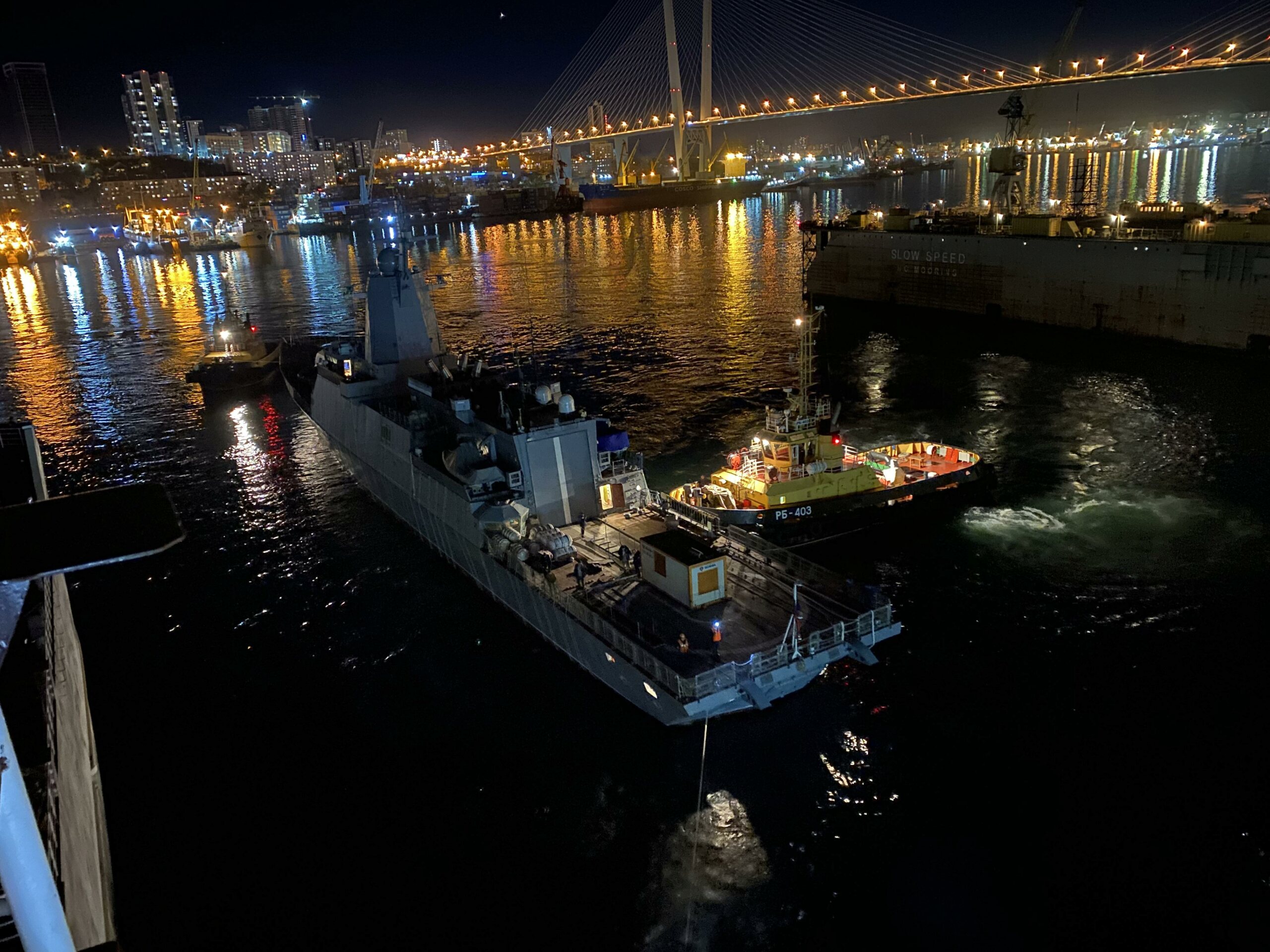
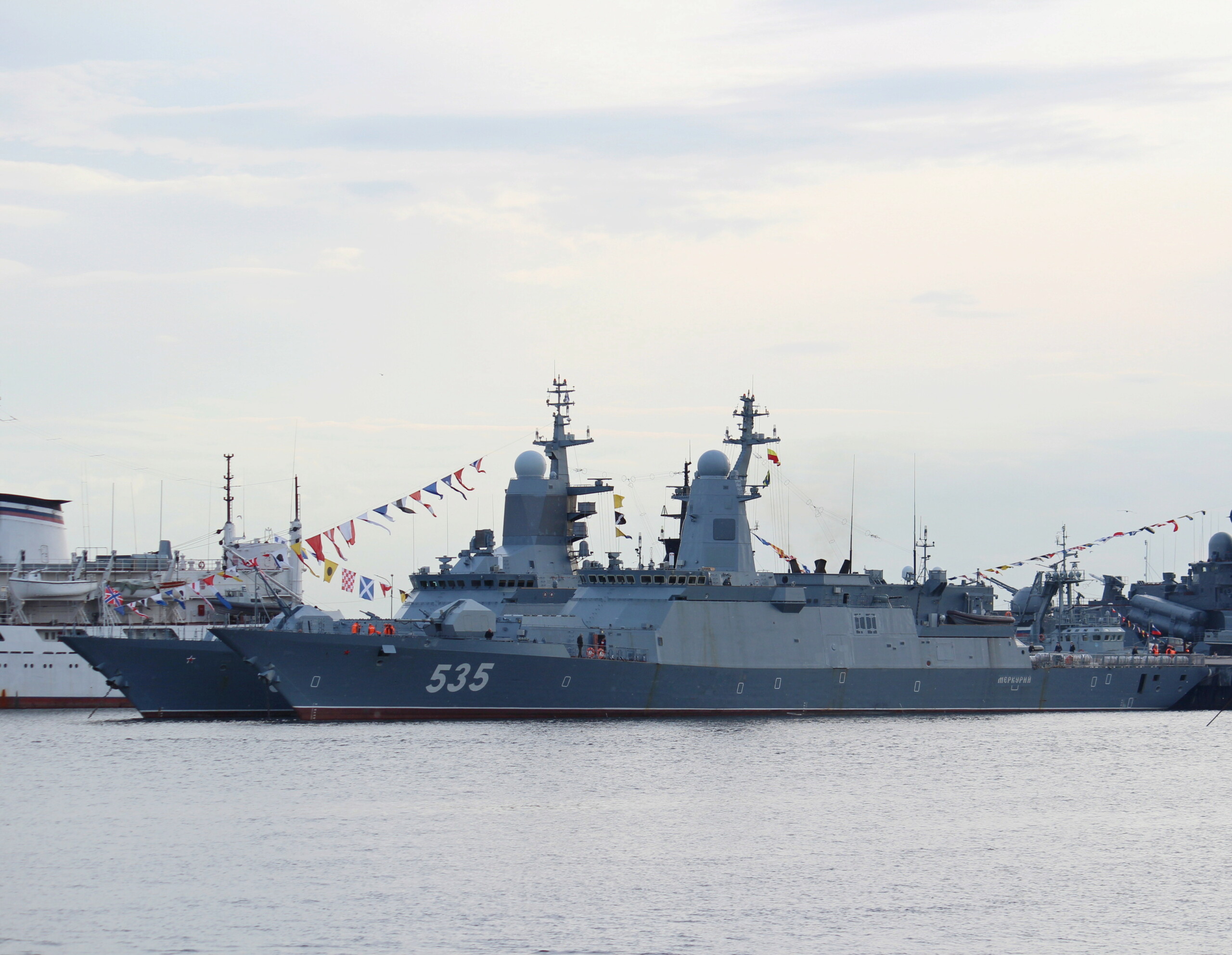
 ALAMO
ALAMO